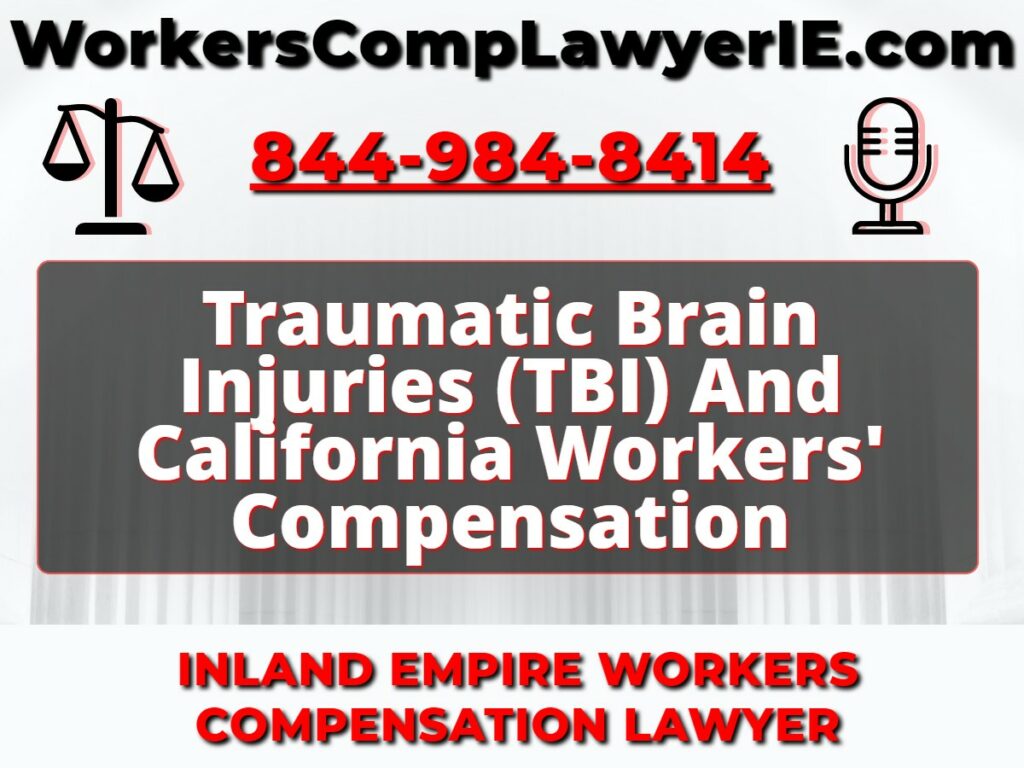Traumatic Brain Injuries (TBI) And California Workers’ Compensation

Introduction to Traumatic Brain Injuries (TBI) And California Workers’ Compensation
Traumatic Brain Injury (TBI), a form of injury that affects the normal functioning of the brain, often occurs as a result of a sudden impact or blow to the head. In the context of workplace accidents, TBIs can be devastating, causing not just physical harm, but also leading to financial uncertainty.
Understanding Traumatic Brain Injuries
TBIs can present a range of symptoms, from mild dizziness, confusion, and headaches to severe conditions such as unconsciousness, memory problems, and emotional difficulties. These symptoms can occur immediately or may surface days or weeks after the injury.
The long-term complications of TBIs can significantly disrupt a person’s life. A worker suffering from a TBI might face challenges like cognitive impairment, loss of motor control, and emotional disturbances. For example, a construction worker suffering from a TBI may no longer be able to operate machinery or carry out his usual tasks due to loss of motor skills.
The Prevalence of TBI in Workplace Accidents
TBIs are alarmingly common in workplace accidents. According to the Centers for Disease Control and Prevention (CDC), TBIs account for around 30% of all injury deaths in the United States. Certain occupations, such as construction, transportation, and emergency medical services, pose a higher risk of TBI due to the nature of the work involved.
Workers’ Compensation Laws in California
In California, workers have the right to receive compensation for injuries sustained in the course of their employment, including TBIs. This compensation can include medical benefits, temporary disability benefits, permanent disability benefits, and supplemental job displacement benefits.
Seeking Compensation for TBI: The Process
The process of seeking compensation starts with reporting the injury to your employer as soon as it occurs. Following this, a workers’ compensation claim must be filed. Once approved, the worker can start receiving benefits.
Consider the case of a warehouse worker who suffered a TBI after a fall. She immediately reported the incident to her employer, filed a claim, and after approval, started receiving benefits for her medical bills and wage loss.
Challenges in TBI Compensation Cases
Obtaining compensation for TBIs is not always straightforward. The injured worker must prove that the injury was work-related, which can be challenging if symptoms did not appear immediately. Furthermore, dealing with insurance companies can be difficult, as they often seek to minimize payouts.
The Importance of Legal Representation
Having legal representation can be crucial in navigating the complexities of workers’ compensation cases. A competent workers’ compensation attorney can help collect evidence, argue the case, negotiate with insurance companies, and ultimately, help the injured worker secure fair compensation. One notable success story involves a factory worker in California who, with the help of his attorney, was able to secure a substantial settlement after suffering a TBI due to a machinery malfunction.
Conclusion to Traumatic Brain Injuries (TBI) And California Workers’ Compensation
Navigating the aftermath of a traumatic brain injury at the workplace can be a challenging journey. It’s a process made easier by understanding your rights, knowing the compensation process, and securing legal representation. Remember, workers’ compensation is not just a legal right; it’s a necessary support in the path to recovery. For a free consultation with an experienced workers’ compensation lawyer in California, call 844-984-8414 today.
